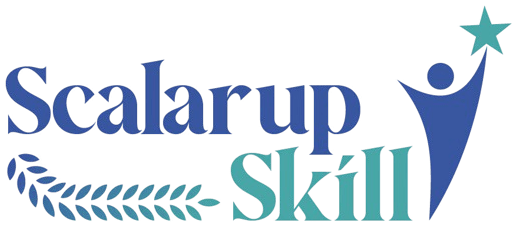DevOps and Cloud Computing

DevOps and Cloud Computing Price ₹25,999 + Gst
DevOps
DevOps is a set of practices that combines software development (Dev) and IT operations (Ops). Our DevOps services at ScalarUpskill aim to shorten the system development life cycle while delivering features, fixes, and updates frequently in close alignment with business objectives. By fostering collaboration and shared responsibility among development and operations teams.
Cloud Computing
Cloud Computing is the on-demand delivery of IT resources and applications via the Internet with pay-as-you-go pricing. ScalarUpskill’s cloud computing services enable businesses to leverage the power of the cloud to achieve:
- Scalability: Effortlessly scale resources up or down based on demand, ensuring optimal performance during peak loads and cost savings during idle periods.
- Cost Efficiency: Reduce capital expenditure by transitioning to a pay-as-you-go model, allowing organisations to only pay for what they use.
- Flexibility: Access a wide range of services and tools to develop, deploy, and manage applications more efficiently.
- Security: Implement robust security measures to protect data and applications, including encryption, access controls, and compliance with industry standards.
DevOps Certification Course Curriculum
Lesson 1: Why DevOps?
- Need and Benefits of DevOps
- Problems with Traditional Software Development
Lesson 2: What is DevOps?
- Definition and Key Concepts
- Core Principles of DevOps
Lesson 3: Agile and DevOps
- Agile Methodology Overview
- Integration of Agile and DevOps Practices
Lesson 4: DevOps Lifecycle
- Phases of DevOps Lifecycle
- Tools and Practices in Each Phase
Lesson 5: DevOps Market Trends
- Current Market Trends
- Future of DevOps
Lesson 6: DevOps Delivery Pipeline
- Continuous Integration and Continuous Delivery (CI/CD)
- Pipeline Automation
Lesson 7: DevOps Ecosystem & Use Case
- Tools and Technologies in the DevOps Ecosystem
- Real-world DevOps Use Cases
Lesson 8: Introduction to Virtualisation
- Virtualisation Concepts and Benefits
- Hypervisors and Virtual Machines
Lesson 9: Introduction to Cloud Computing
- Cloud Service Models: IaaS, PaaS, and SaaS
- Major Cloud Providers: AWS, Azure, and GCP
Lesson 1: Overview of Version Control Systems
- Importance of Version Control
- Centralized vs Distributed Version Control Systems
Lesson 2: Introduction to Git
- Git Basics and Installation
- Git File Workflow
- Important Git Commands
- Branching and Merging
- Stashing, Rebasing, Reverting, and Resetting
Lesson 3: Introduction to GitHub
- Setting Up GitHub Account
- Using Git and GitHub Together
- Collaborating with GitHub
Lesson 1: Overview of Various Build Tools
- Importance of Build Tools
- Popular Build Tools: Maven, Gradle
Lesson 2: What is Maven?
- Maven Basics and Installation
- Maven Plugins and Archetypes
- Project Object Model (POM)
- Source Control Integration with Maven
Lesson 1: What and Why of Containers
- Introduction to Containers
- Benefits of Containerisation
Lesson 2: Difference between VMs and Containers
- Virtual Machines vs Containers
- Use Cases for Each
Lesson 3: Docker Architecture and Components
- Docker Installation and Setup
- Docker Components: Images, Containers, and Registries
Lesson 4: Image Distribution using Docker Hub
- Pushing and Pulling Images
- Working with Docker Hub
Lesson 5: Working with Containers and Docker Hub
- Creating and Managing Containers
- Docker Commands
Lesson 1: Overview of Continuous Integration
- CI Concepts and Benefits
- CI Pipeline
Lesson 2: Overview of Jenkins
- Jenkins Architecture
- Installing and Configuring Jenkins
Lesson 3: Jenkins Management
- Managing Jenkins Jobs
- Jenkins Plugins
Lesson 4: Jenkins Build Pipeline
- Creating and Configuring Build Pipelines
- Integrating Jenkins with Other Tools
Lesson 1: Overview of Continuous Testing
- importance of Continuous Testing
- Testing in DevOps
Lesson 2: Software Testing Lifecycle
- Phases of Testing Lifecycle
- Types of Testing: Unit, Integration, System, Acceptance
Lesson 3: Test-Driven Development Approach using JUnit
- Introduction to TDD
- Writing Test Cases with JUnit
Lesson 4: Testing Web Applications using Selenium
- Selenium Basics and Installation
- Writing and Running Selenium Tests
Lesson 5: Performance Testing with Apache JMeter and BlazeMeter
- Introduction to Performance Testing
- Using JMeter for Load Testing
- Integrating JMeter with BlazeMeter
Lesson 1: Docker Commands and Use-Cases
- Advanced Docker Commands
- Real-world Docker Use Cases
Lesson 2: Docker Files
- Writing Dockerfiles
- Building and Managing Docker Images
Lesson 3: Docker Compose
- Introduction to Docker Compose
- Writing Docker Compose Files
Lesson 4: Docker Networking
- Docker Network Types
- Managing Docker Networks
Lesson 5: Docker Swarm
- Introduction to Docker Swarm
- Setting Up and Managing Docker Swarm
Lesson 1: Introduction to Kubernetes
- Basics of Kubernetes Container Orchestration
- Differences between Docker Swarm and Kubernetes
Lesson 2: Kubernetes Architecture
- Kubernetes Components: Nodes, Pods, Services, etc.
- Installing Kubernetes using Kubeadm
Lesson 3: Working with Kubernetes
- Creating Pods and Deployments using YAML
- Selectors & Labels in Kubernetes
- Using ReplicaSets & Rolling Updates
- Scheduling Applications on Containers
- Services in Kubernetes
Project Planning and Implementation
- Developing a Complete DevOps Pipeline
- Integrating Tools and Best Practices
Course Review and Q&A
- Final Examination
- Certification and Career Guidance

